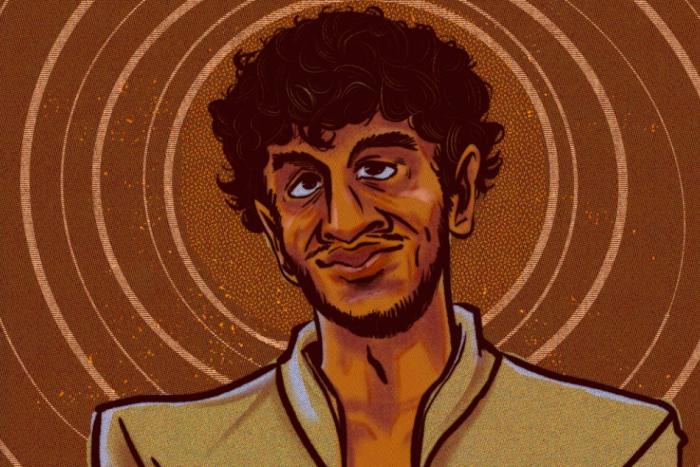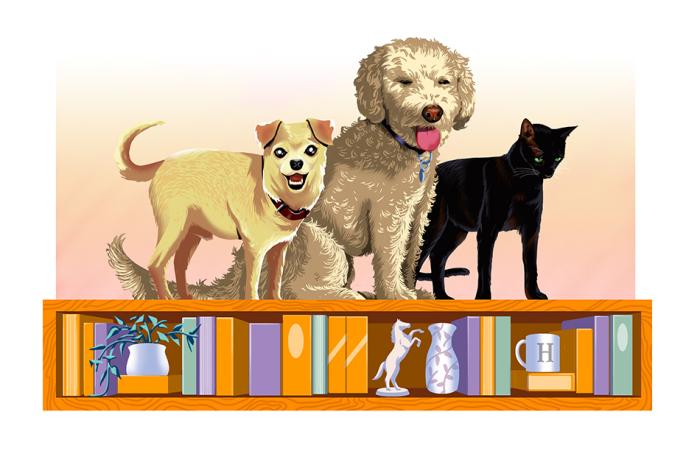High Windows
The summer I borrowed the white pantsuit was the summer The Weaver and I found The Window Washer, a teenager who grew up and disappeared. The Weaver and I first mentored her, through a performance project we led together in Montréal. When she had graduated from high school, we invited her to Toronto for a few months to work on a new show with us. She was just old enough to live alone, but we felt responsible for her, so we asked her to do things like text us when she got home to the sublet we had found her in my neighbourhood. She took our phones and made us each our first Snapchat account, with the profile names 1 of my 2 moms and one of my two moms. When the work and the sublet were up, she stayed with me one last night before catching a train back to Montréal. I said let’s rent a movie, so The Window Washer and I walked together down Church Street to one of the only video stores left in town. She said she liked old movies, and told me her favourite was The Colour Purple; she said she watched it every New Year’s Eve and that it made her want to be an actor. We browsed through the DVD jackets and she settled on Terms of Endearment—because it was made around the same time as The Colour Purple, and because she liked the title. She fell asleep halfway through, and I covered her in blankets. After she’d gone, I found an envelope beneath the pillow I’d slid under her head the night before. Inside there was a photograph of the two of us, along with a bookmark that read, “Children outgrow everything, except a mother’s heart.”
After that, The Weaver and I didn’t hear from The Window Washer. Weeks turned to months. No one had heard from her. We started asking around. We tried lots of things: scoured the Internet, called her old high school principal, reached out to anyone on Facebook who had liked her last profile picture. Nothing. No trace of her. One of her friends wanted to hire a private investigator but didn’t have enough money.
A full year after The Window Washer had left my apartment, I was walking down Church Street and noticed that the video store had closed—an unrelated finality that prompted me to call the police. There were lots of reasons to be worried. The police confirmed that there had been no record of death, but said I couldn’t file a missing-persons report because I wasn’t family. I wondered the obvious things: What if she was in trouble and no one was looking for her? What happened to people who didn’t have family able to file a report? The officer on the phone asked if she could take down the last known address and send someone to go look into it, but I pretended I didn’t know where she had lived. I was suddenly feeling hot and nauseous, worried that I could make things worse by sending the police to her neighbourhood. It didn’t seem like a safe thing to do. I wished I hadn’t called the police at all. The Weaver and I had run out of ideas to find our girl.
Finally, another six months later, someone messaged me to say they had seen The Window Washer back around her old place. The Weaver and I decided to drive to the Montréal suburb where The Window Washer had lived. We stood at her door and knocked, and knocked, and knocked. The light was on upstairs, so we called out her name. I threw a plastic bottle of Advil at the window that I had in my bag—stones seemed too cliché. Nothing.
The next morning, there were no fresh footprints in the snow. We parked in the visitors’ lot of the housing complex and watched all the boys come out to shovel, the girls dragging home weekend shopping bags, and snowballs flying between units from the hands of younger kids. We just sat in the car, waiting and watching the door to The Window Washer’s unit. The Weaver and I were worried she hadn’t gone out in months. Or worse. There was very little to say and even less to do.
Then I started bleeding. The Weaver said she’d stay and keep watch while I looked for a drugstore. The Window Washer loved Pharmaprix, so I went in there instead of the pharmacy in the competing superstore, at the edge of the neighbourhood. On the way to the feminine hygiene aisle, I saw The Window Washer in the hair-care section. I followed her slowly, past the makeup and the chips, trying not to scare her off. And then I lost her again. Because, of course, it wasn’t really her. I just couldn’t help thinking she had walked those aisles before. That there were traces of her there, like there were under the snow, where no tracks led up to her door. Like the traces of my feet on that bridge in Kyoto. The Weaver and I drove home, a pair of defeated surrogates. Winter ended and spring came and went. All the while, we wrote The Window Washer letters, not knowing if she was getting them.
In early summer, I decided to try one more time. I took a train to Montréal and hand-delivered one more note to the door:
We love you, Window Washer. This is my phone number. Please call.
There were a few hours before my train home, so I wandered around in Parc Lafontaine. I was sitting watching some kids feed ducks when my phone rang.
Are you still here? The Window Washer asked.
I couldn’t believe it.
I’m calling from a pay phone, she said. Can I come meet you?
We sat in the park and hugged each other, as she told me about the unopened stack of our letters under her bed, calling her to come back out into the world.
I just wasn’t ready, she said. But I’m ready now. I’m sorry. Thank you for not giving up on me.
I really had no idea if we were doing the right thing, I told The Weaver over the phone as I boarded the train. I think she’s going to be okay, I said.
I heard The Weaver exhale, in time with my own relief.
The next time I was in Montréal, I visited The Window Washer. She had a new job washing windows at the tops of skyscrapers. She said she really appreciated the view.
*
I did this call with a stranger recently—theatre on the telephone. I was paired with another audience member, and we were guided through questions to ask each other. My performance partner was older, in her sixties or seventies, not religious, had cats and no kids. Loved books. I think she was a teacher. These are some of the things I gleaned about her, from her answers to the questions. She seemed really self-critical: she didn’t think she had courage, didn’t dance because she’s “not good at it,” said she wasn’t good in an emergency. I told myself a story about her. But then she spoke so easily of a person she loved, and when I asked if she had ever scaled a fence or dived from great height, she didn’t hesitate.
Of course, she said.
I felt relieved. I couldn’t actually make any assumptions about her life. The stories we tell can be misleading.
I once mistook loving a story for loving a person. I broke a heart this way and felt very ashamed and sorry. So perhaps I should feel no shame in stating: I met The Turtle online. No meet-cute origin story.
He looks nice, said The Gilmore Girl, as she swiped right. He’s a tech journalist—You could use some tech support.
The Gilmore Girl was doing all the swiping.
Plus, you should date him ’cause I need a brown dad—both for the role model and so people might actually believe you and me are related. Obviously.
The Gilmore Girl is my chosen family. She used to live with me sometimes. You could say it was nice of me to make a space for her, but I actually think it was nicer for me. I loved the notes she’d leave around the apartment.
By the closet:
I had to steal your jean jacket—it was an emergency.
On the fridge:
I made some pasta in the kitchen for myself. I would have left you some but I finished the sauce and it seemed weird to just leave plain pasta.
On the window:
Thank you for existing. (I’ll come back to help you put up the new blinds.)
By the record player:
There are always good jams to help with the overwhelmingness.
On the kitchen table:
Eat the treats. Do your physio. Drink water. Sleep.
Just inside the front door:
Thank you for letting me think of this place as home.
At the end of our first date, The Turtle was getting up to leave, and then sat back down.
Hey, he said. I want to be completely upfront: I have a daughter, and I live with her mother. It’s totally platonic now, and she has a new partner—but we still share a house to co-parent.
I swallowed hard and thought, Well, I guess we’re doing this, and heard myself say: Okay. Well. I was married. I’m technically still married, if that matters to you…And I’m nearing forty and want to have a baby—so if you don’t want to do that again, we probably shouldn’t do this.
It was the first time I had said any of those words to anyone. We stood up, shook hands, and said goodnight.

$213 Divorce
Nine years, one month, and two days after I took The Ex-Husband to Pearson International Airport, marking the end of our ten years together, I filed for divorce. Or rather, I paid $213 for a red stamp on a document that signified the beginning of that process. When I got to the first service window, where they triage you and give you a number, the man behind the counter glared at the separation date on my paperwork.
This was a long time coming, eh? he said, as if making an astute observation.
For the nine years prior to this particular day, getting divorced had just been an item that sometimes appeared on a list, on a scrap piece of paper, lying around on the kitchen counter, or found in a coat pocket:
Parsley
Alice’s website
Get divorced
Grant report
Gift for mum
Shoelaces
While I waited for my number to appear on the screen, it occurred to me that I’d better let The Ex-Husband know I was divorcing him. I typed an email with my thumb:
Cheri,
You’re still at the same address, oui?
I am sending you divorce papers…maybe today.
Talk soon?
Sorry this is such a weird email.
Love,
After I hit Send, my phone rang and it was the intake coordinator at the fertility clinic. Despite my blood work indicating that I had the egg volume of a twenty-five-year-old (Alice was right, thank you very much), my doctor had suggested that, because we couldn’t measure the quality of my eggs—or anyone’s eggs, for that matter—I should still do an intake with a fertility doctor.
Just so you have options, he’d kept saying—because of your age.
The intake coordinator asked if I had a male partner, and then asked me for his date of birth. I couldn’t remember the year. All I could think was: The Ex-Husband was born in 1977. I told the intake coordinator The Turtle’s age and birthday to stall while I did the math to calculate the year.
Don’t worry, she said, you’d be surprised how many people can’t even remember their partner’s birthdays. They’re distracted. They have another birth in mind.
I mourned the loss of the child The Ex-Husband and I would never have. I didn’t wish we were still together, but I would have liked to meet that kid.
By the time I got off the call with the intake coordinator, there was already a new email from her, about a session for both partners with our assigned fertility doctor. I forwarded the email to The Turtle with this note:
What a day. Sending you this from divorceland…(reverse shotgun wedding?)
It was raining when I left the court office with my $213 red stamp in hand. I was shrinking myself from the rain, peering down at the road from under my hood, but when I looked up I saw I was biking toward two rainbows.
No way, I thought. One for each of them: these ends and beginnings.
At the first red light I texted Alice:
I just filed for divorce and got an appointment with a fertility doctor.
Then, an email reply came in from The Ex-Husband:
Hello future ex-wife,
How can you do that to me! You’re tearing my heart apart. Being married is so cool! I don’t want to be single!
I am still at the same address but I will move with my girlfriend soon…she doesn’t want to be married again, so if you divorce me I’ll be single forever. You’re so cruel.
Gros bisous,
That guy has a one-of-a-kind sense of humour. I felt so grateful for the possibility of love that is alive in memory, without bitterness. A love that makes room for new love.
My phone whistled with a holy shit! text from Alice before I put it back in my pocket and biked ahead.
Excerpted from These Songs I Know By Heart (2024, Book*hug Press) by Erin Brubacher. Tent icon designed by Malcolm Sutton.






